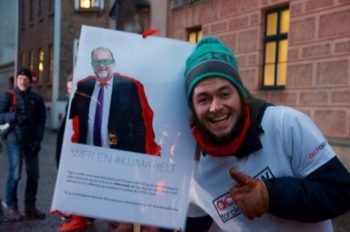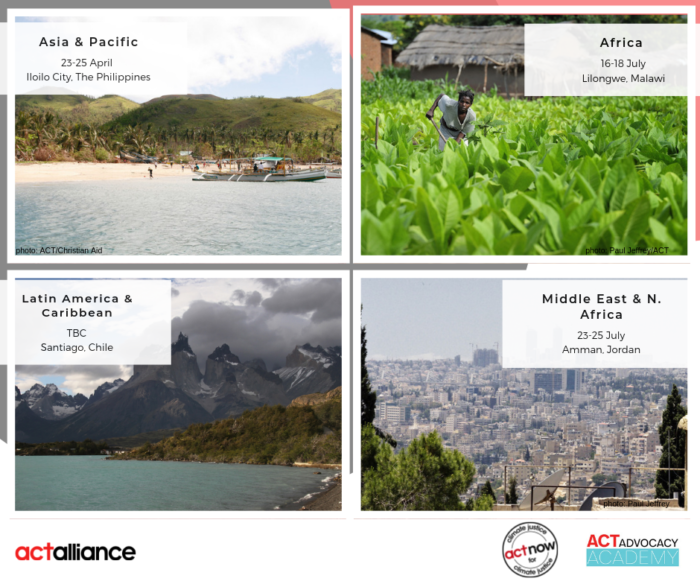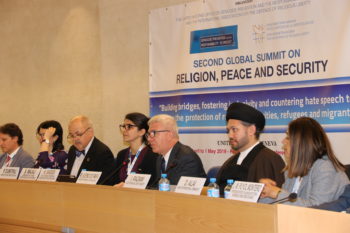Jeroen Jurriens is a DRR/Resilience expert working at the Disaster Management Unit of ICCO & Kerk in Actie, the ACT Alliance member from the Netherlands. In his position he is responsible for coordination of disaster response work in the regio of Central & Eastern Africa, as well as being Thematic Advisor for the organisation on Resilience, DRR and Emergency Preparedness (EPRP). He has been the chair of the ACT Alliance Community of Practice on DRR/CCA since the past 4 years; and as part of the CoP DRR-CCA been involved in the Sendai Framework discussions and its predecessor HFA since 2013. Furthermore Jeroen is co-chair of the ACT Alliance Working Group on EPRP.
What is the GPDRR & why is it important for CSOs to participate?
The Global Platform for Disaster Risk Reduction, is a biennial multi-stakeholder forum established by the UN General Assembly to review progress, share knowledge and discuss the latest developments and trends in reducing disaster risks. As such, the Global Platform is a critical component of the monitoring and implementation process of the international leading framework: the Sendai Framework for Disaster Risk Reduction (2015-2030). This year’s Global Platform theme was the ‘Resilience Dividend – Toward Sustainable and Inclusive Societies’.
CSOs’ participation in these platforms is crucial as our main aim is to give people at risk of being affected by disasters a voice in the discussions. We share their concerns and demands with those governments and decision-makers who shape policies at the international level. For CSOs, it is important to promote locally-led DRR strategies, where communities & local actors actively participate as decision-makers. As CSOs we want SFDRR’s aim to enhance resilience to bebased on rights, empowered communities, accountability, and the principle of leaving no one behind.
CSOs’ participation helps promote inclusive DRR strategies where the most vulnerable and at risk, can actively participate. And, of course as civil society we demand accountability. Before each GPDRR all governments need to report on their progress on the Sendai Framework for Disaster Risk Reductionand during the GPDRR governments normally make statements on what they have achieved so far. Both can be used by CSOs to hold States accountable.
What did ACT call for at this year’s GPDRR?
ACT put forward a very strong call for local-level engagement in all phases of DRR policy-making. Together with other faith-based groups we also called for meaningful and substantive inclusion of FBOs and faith communities in the SFDRR processes.
We have presented a statement that I invite you to read.
What were the main conclusions from GPDRR?
The chair’s summary concluded that the current pace and scale of action will not achieve the targets of the Sendai Framework, which in turn will jeopardize the achievement of the SDGs by 2030. The Global Platform recognized the challenges ahead and called for greater ambition, commitment, and leadership by all governments and stakeholders.
Although we welcomed the strong reference in conclusion of GPDRR to accelerate coherence between agendas and the explicit reference to climate change, we had hoped for more clear implementation plans and more concrete commitments. However, we hope that the deliberations at this year’s GPDRR at least provide a way forward for the implementation of the Sendai Framework to adequately respond to the multiplicity of hazards and risks, especially those posed by climate change. We believe that the efforts to protect the most vulnerable must be scaled up.
On a positive note, progress towards gender equalty and accessibility was evident throughout the platform’s proceedings, although further work is needed on both fronts in practice on the ground.
Finally the platform stressed the need for risk-informed development. In practice, however, the application of risk-informed investment and development decisions are still the exception rather than the rule. This must change!
You can read the full summary by the chair here: https://www.preventionweb.net/files/58809_chairsummary.pdf
How will we follow-up and how can members be involved?
As ACTAlliance, we will continue to stay involved in the Sendai Framework by monitoring the implementation of the commitments. We have already formulated a draftof our work plan for the coming two years, including the thematic areas of focus in the DRR. These include locally-led DRR, DRR in conflict/fragility, survivor and community-led response (SCLR), ecosystems-DRR, DRR and social safety nets, etc.
The first concrete next step we will take is organizing a consultation in June/July, 2019 for all ACT members. We will specifically ask which thematic DRR topics ACT Alliance should focus on, on which topics our members would welcome additional learning, and where members will be able to contribute with expertise and practical experiences from the ground. We strongly recommend and invite all ACT members to participate in this consultation! It is their chance to steer future actions of CoP DRR-CCA and a stepping stone to become more involved in the CoP DRR-CCA work.
Regional consultations will be then organized to prepare for the next proceedings. As ACT CoP DRR-CCA we plan to support all interested ACT members by strengthening their capacity on the chosen thematic areas and develop lobbying strategies at the national and regional levels. We hope to be even better prepared for GPDRR 2021.
What can ACT members do? How can ACT members become involved in the CoP DRR-CCA work?
I have a few milestones that our member should mark in their calendars:
- May 2019: Look up your government’s statement made at GPDRR through this link: https://www.unisdr.org/conference/2019/globalplatform/programme/official-statements. Analyze it and share your feedback with the CoP DRR-CCA.
- June 2019: Participate in the consultation on thematic focus developed by the CoP DRR-CCA
- Be active at the local and national level by monitoring DRR commitments of your government, and share those experiences with the CoP DRR-CCA and fellow ACT-members;
- Become part of the CoP DRR-CCA network in your region. Contact details: Latin/South America – Carlos Rauda (carlos.rauda@actalliance.org), Africa – Patricia Roy Akullo (prak@dca.dk), Asia – James Munpa ( james.munpa@actalliance.org), Global – Jeroen Jurriens (jurriens@icco.nl)
- Share your case studies and best practices on DRR / CCA / Resilience with CoP DRR-CCA and across the ACT Alliance.
- Start thinking about your submission for the ACT Alliance Resilience Award 2021!
 Mads is a volunteer project coordinator at Change Maker Denmark’s Climate Initiatives. Mads is also a student at the University of Copenhagen, studying social anthropology.
Mads is a volunteer project coordinator at Change Maker Denmark’s Climate Initiatives. Mads is also a student at the University of Copenhagen, studying social anthropology. Wendi Bevins is the Monitoring, Evaluation and Learning Manager for Lutheran World Relief. She provides MEL technical support to project teams around the world working on project design, set-up, monitoring, analysis, and evaluation. Her research interests include learning how to measure and analyze resilience efforts and how to effectively integrate gender sensitive responses to resilience programming.
Wendi Bevins is the Monitoring, Evaluation and Learning Manager for Lutheran World Relief. She provides MEL technical support to project teams around the world working on project design, set-up, monitoring, analysis, and evaluation. Her research interests include learning how to measure and analyze resilience efforts and how to effectively integrate gender sensitive responses to resilience programming.

